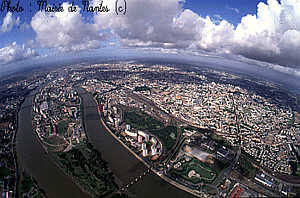|
|
 |
|
|
 |
Nantes is the capital of the département "Loire-Atlantique"
, in the region "Pays de la Loire", western France.
Situated at the head of the Loire River estuary, where it is joined
by the Erdre and the Sèvre rivers, 35 miles (56 km) from the sea
and southwest of Paris, it is one of the French towns most changed in the
20th century.

Nantes derives its name from the Namnètes, a Gallic
tribe who made the town their capital. It became a commercial centre under
the Romans. The Normans, after pillaging the town, occupied it from 834
to 936. After a long struggle in the Middle Ages between the counts of
Nantes and Rennes for the sovereignty of Brittany, in 1560, Francis II,
king of France (1559-60), granted Nantes a communal constitution. During
the Wars of Religion (1562-98), Nantes joined the Catholic League and only
opened its gates to Henry IV, king of France (1589-1610), in 1598, the
same year he signed the Edict of Nantes, a charter assuring religious and
civil liberties to the Protestants. During the French Revolution, Nantes
suffered the ruthless repression of an envoy of the revolutionary Committee
of Public Safety named Jean-Baptiste Carrier. In 1793 Carrier replaced
executions by the guillotine, which he considered too slow, by mass drownings.
The city was occupied by the Germans during World War II.

Greatly modified by an urban renewal plan that was adopted in 1920,
Nantes was further altered and extended after having been partly
destroyed in World War II. Arms of the river have been filled up and made
into roads; the railway, which used to cut across the town, now runs largely
underground; and the port has been extensively rebuilt. Under a national
planning scheme, Nantes has been made a major economic development centre.
In the late 20th century, road, air, and rail communications were being
extended, and vast industrial zones were being built. The well-equipped
port has more than 2 mi of quays, and the river has been dredged to allow
access to larger vessels; it functions in close association with Saint-Nazaire,
its outport (seaward terminal for deep-draft vessels).
The shipbuilding yards are important. The chemical (fertilizers, paint)
and mechanical (rail and aircraft equipment) industries expanded during
the 1970s. The traditional food industries (fruit preserves and baked goods)
continue.
The original university
(founded 1460) was abolished during the French Revolution, but a new one
was established in 1961.